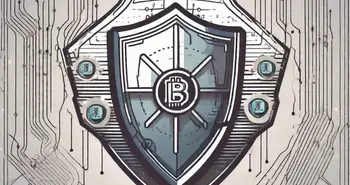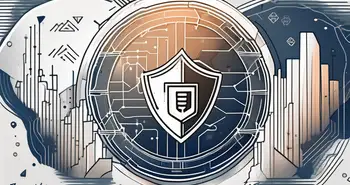Essential Tips for Crypto Protection

As a seasoned expert in the field of cryptocurrency, I understand the vital importance of keeping your digital assets secure. In this article, I will provide you with essential tips and strategies to safeguard your crypto investments, ensuring peace of mind and protecting your hard-earned wealth.
Understanding the Importance of Crypto Security
Before delving into the nitty-gritty of crypto security, let's grasp the significance of this topic. The rise of cryptocurrency has revolutionized the financial landscape, offering individuals unprecedented control over their funds. However, this power comes with great responsibility, as the decentralized nature of digital currencies leaves them susceptible to malicious attacks and scams.
Why should you care about crypto security, you might ask? Well, consider this alarming fact: according to a recent study, crypto-related crimes and frauds amounted to a staggering $10 billion in losses last year alone. As an expert, I've witnessed countless individuals falling victim to hackers, scammers, and phishing attempts, losing their hard-earned money overnight. But fear not, for I am here to equip you with the necessary knowledge to thwart such threats.
One of the most prevalent threats in the world of crypto security is the dreaded “cryptojacking.” This insidious form of attack involves hackers hijacking your computer's processing power to mine cryptocurrencies without your knowledge or consent. Imagine the shock of discovering that your computer has been silently working for someone else's financial gain, all while you were unaware. It's a violation of your privacy and a drain on your resources.
Another area of concern is the vulnerability of cryptocurrency exchanges. These platforms act as intermediaries for buying, selling, and trading digital currencies. While they provide convenience and accessibility, they also present a prime target for hackers. In recent years, we've witnessed several high-profile exchange hacks resulting in millions of dollars being stolen. The aftermath of such attacks can be devastating, leaving users in financial ruin and eroding trust in the entire cryptocurrency ecosystem.
Basic Principles of Cryptocurrency Protection
In the realm of cryptocurrency, knowledge is power. One fundamental principle of protecting your digital assets lies in understanding the role of private keys. Just like a physical key grants access to a lock, a private key enables you to control your cryptocurrency wallet. Safeguard this key with utmost diligence, never sharing it with anyone, and consider utilizing a hardware wallet for an added layer of security.
But what exactly is a private key? Think of it as your secret passphrase, a unique combination of characters that acts as the key to your digital treasure chest. It is generated by your wallet software and is mathematically linked to your public key, which is the address where others can send you cryptocurrency. Your private key is what allows you to access and manage your funds securely.
When it comes to protecting your private key, there are a few best practices to keep in mind. First and foremost, never share it with anyone. Your private key should be treated like the most valuable possession you own. Just as you wouldn't hand over the keys to your house to a stranger, you should never give your private key to anyone, no matter how trustworthy they may seem.
Furthermore, consider utilizing a hardware wallet for an added layer of security. A hardware wallet is a physical device that stores your private keys offline, away from potential online threats. It acts as a secure vault for your digital assets, providing an extra level of protection against hackers and malware. With a hardware wallet, your private keys never leave the device, making it nearly impossible for cybercriminals to gain unauthorized access.
Secure wallets are another crucial component of crypto protection. Opt for well-established wallets that employ robust encryption and multi-factor authentication. Remember, storing your crypto on exchanges is risky, as they become prime targets for hackers. Take charge of your financial security by utilizing your very own wallet.
When choosing a wallet, consider factors such as the wallet's reputation, security features, and user-friendliness. Look for wallets that have a strong track record of security and have been audited by reputable third-party organizations. Additionally, ensure that the wallet supports multi-factor authentication, which adds an extra layer of protection by requiring multiple forms of verification before granting access to your funds.
Remember, protecting your cryptocurrency is not a one-time task but an ongoing effort. Stay informed about the latest security practices and be vigilant in keeping your private keys and wallets secure. By following these basic principles of cryptocurrency protection, you can safeguard your digital assets and enjoy the benefits of this revolutionary technology with peace of mind.
Advanced Security Measures for Cryptocurrency
Now that we've established the bedrock of crypto security, let's explore some advanced measures to fortify your digital fortress. Two-factor authentication (2FA) is a crucial tool in your arsenal. By requiring an additional piece of information to access your accounts, such as a unique code sent to your mobile device, you drastically reduce the risk of unauthorized access.
When it comes to protecting substantial sums of cryptocurrency, a hardware wallet is a must-have. This specialized device functions offline, safeguarding your private keys from any online threats. Think of it as your very own Fort Knox, ensuring the highest level of security for your digital assets.
Avoiding Common Cryptocurrency Scams
In the vast and rapidly evolving landscape of cryptocurrency, scams are all too prevalent. To navigate these treacherous waters unscathed, it's essential to develop a keen eye for identifying phishing attempts. Never click on suspicious links, double-check website URLs, and beware of unsolicited emails asking for your credentials. Remember, a little skepticism goes a long way in protecting your hard-earned crypto.
Another common scam involves fake exchanges and wallets. Always do your due diligence before entrusting a platform with your funds. Research the exchange's reputation, read reviews from trusted sources, and choose platforms with a solid track record in security. Better safe than sorry.
Regular Maintenance for Crypto Security
Crypto security is not a one-time endeavor; it requires consistent effort and regular maintenance. Stay up-to-date with the latest software updates for your wallets and exchanges, as these often include crucial security patches. Falling behind on updates exposes you to potential vulnerabilities that malicious actors can exploit.
Routine wallet backups are another essential aspect of maintaining crypto security. Store these backups in secure, offline locations, such as encrypted USB drives or hardware wallets. No one wants to be caught off guard by a computer malfunction or a lost device with no means of recovering their precious digital assets.
Personal Expert Advice
Over the course of my career as a crypto expert, one piece of advice I always emphasize is to never underestimate the importance of personal responsibility in safeguarding your digital wealth. While technological advancements can bolster security, it ultimately falls upon the individual to exercise caution and remain vigilant.
One way to ensure you remain on top of your crypto security game is to spread your investments across multiple wallets and exchanges. By adopting a diversified approach, you minimize the risk of losing all your funds in case of a security breach on a single platform.
FAQ
Why is crypto security important?
Crypto security is crucial because the decentralized nature of cryptocurrencies leaves them vulnerable to attacks and scams. Without proper security measures in place, your digital assets can be stolen or lost.
How can I protect my crypto?
Protect your crypto by understanding the role of private keys, using secure wallets, implementing two-factor authentication, and considering hardware wallets for enhanced security.
What are the common crypto scams to watch out for?
Common crypto scams include phishing attempts, fake exchanges, and fake wallets. Be cautious of suspicious links, validate website URLs, and conduct thorough research before utilizing any platform.
What regular maintenance is required for crypto security?
Regular maintenance includes staying up-to-date with software updates for wallets and exchanges and ensuring routine wallet backups.
Any additional expert advice?
Adopt a diversified approach to your crypto investments and remain vigilant in monitoring potential security threats.
By adhering to these essential tips and staying informed about the ever-evolving landscape of crypto security, you can safeguard your digital assets and ensure a prosperous future in the world of cryptocurrency. Remember, vigilance and personal responsibility are the keys to maintaining the highest level of protection for your valuable crypto holdings.
Now that you're equipped with the knowledge to protect your crypto, take the next step in your investment journey with Morpher. Experience the future of trading on a platform that offers zero fees, infinite liquidity, and the safety of a non-custodial wallet. Whether you're looking to trade cryptocurrencies, stocks, forex, or even unique markets like NFTs, Morpher provides a unique trading experience with fractional investing, short selling, and up to 10x leverage. Ready to transform your trading? Sign Up and Get Your Free Sign Up Bonus at Morpher.com, and join the revolution in global investing.

Disclaimer: All investments involve risk, and the past performance of a security, industry, sector, market, financial product, trading strategy, or individual’s trading does not guarantee future results or returns. Investors are fully responsible for any investment decisions they make. Such decisions should be based solely on an evaluation of their financial circumstances, investment objectives, risk tolerance, and liquidity needs. This post does not constitute investment advice.

Painless trading for everyone
Hundreds of markets all in one place - Apple, Bitcoin, Gold, Watches, NFTs, Sneakers and so much more.

Painless trading for everyone
Hundreds of markets all in one place - Apple, Bitcoin, Gold, Watches, NFTs, Sneakers and so much more.









